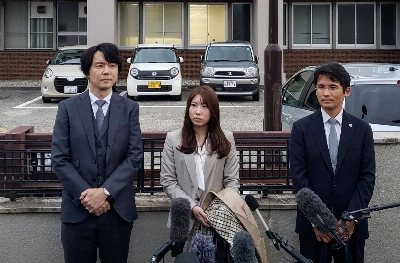Visit any Latin dance club and you'll hear the salsa music blaring well before you get through the doors. But this month at dance clubs across Japan there'll be another sound as well: the buzz over a new, free-of-charge magazine on Peruvian life in this country that's being distributed not only at clubs but at Latin-American food retailers and restaurants from Hokkaido to Okinawa.
The Spanish-language monthly Wakaranai ("I don't know" in Japanese) is the brainchild of Mario Castro, 36-year-old Japan correspondent for the leading Peruvian newspaper El Comercio. The initial print run of 6,000 copies went out Sept. 1.
Though the 22-page glossy's title may seem odd for a publication billing itself as a wellspring of information, the editor is confident it will resonate with readers. "Wakaranai is the first word we all hear and say upon first arriving in Japan," said Castro, a native of Lima, Peru's capital, who has lived here for almost 13 years.
Starting -- and sustaining -- a publication in any market is notoriously hard, but Castro's target audience presents a particularly daunting challenge.
Almost all the estimated 70,000 Peruvians in Japan -- as many as a fifth of them illegal immigrants and living across the country, with concentrations in Kanagawa and Tochigi prefectures -- are factory workers sending large chunks of their earnings home.
That leaves little money for spending in Japan, in turn lowering incentive for companies to advertise in the magazine. Not that this discourages Castro -- a tall man with green eyes and a penchant for saffron-yellow and mango-orange shirts.
When he isn't out reporting, Castro meets with the far-flung Peruvian shop owners who distribute his magazine, pleads with advertisers over his cellular phone, or does both at the same time.
All that, while creating content, too: Nearly every byline and photo tag in the magazine reads "Mario Castro." The journalist has tried hard to appeal to readers from every demographic segment, for example with stories on soccer, salsa and Peruvian home cooking. Promisingly for the shoestring operation, there are several ads, too.
Hard news gets priority. The first article, on page 4, discusses the 18-year prison sentence handed out to Enrique Jorge Morales Toguchi, a Peruvian man living in Japan, who was convicted of reckless driving that killed two people.
Pages later, on a more positive note, is a fashion spread featuring Katherine del Rosario Pantoja Takase -- an attractive young factory worker in Chiba with ambitions to study aviation in Spain.
Many of the family names appearing in Wakaranai are, like Toguchi and Takase above, Japanese in origin -- reflecting the fact that over 85 percent of Peruvian immigrants here have Japanese ancestry. No surname is better known than the one on the front cover, beneath a caricature of its bearer: Fujimori.
Alberto Fujimori, the former president of Peru, quickly became the highest-profile arrival from Lima in November 2000, when, amid a corruption scandal, he fled to Japan and faxed home his resignation. With Japanese citizenship obligingly confirmed soon afterward by the government in Tokyo, he began a self-imposed exile in the country of his parents' birth.
Despite charges against Fujimori in Peru that include involvement in murder, embezzlement and dereliction of duty -- and an Interpol wanted notice -- Japan insists it cannot hand him over because it lacks an extradition treaty with Peru.
Castro gives most space in the magazine -- four pages -- to Fujimori, with an article on his reported relationship with socialite author and hotel-owner Satomi Kataoka, whom The New York Times called his "companion"; a list of spots in Tokyo where Fujimori has stayed; and a brief on Peruvian efforts to have him extradited for alleged human rights violations. (Fujimori, on his Web site www. fujimorialberto.com scoffs at such allegations, terming them "political persecution.")
So far, the magazine is winning praise in many quarters. The Peruvian Embassy applauded Castro for keeping the spotlight on Fujimori, whom it considers a fugitive. Other Latin Americans, meanwhile, are simply happy for any added source of local news in Spanish. Castro says he has received personal congratulations from the ambassadors of Peru, Bolivia and El Salvador.
And, since his cell number is published in the magazine, he is swamped with calls from readers, too. "My cell batteries keep dying," he said.
Fielding one such call on a recent afternoon, from a persistent Peruvian woman demanding more copies, Castro rolled his eyes and looked -- fleetingly -- like the task he has taken on may be bigger than expected.
That soon passed. After all, it only proved that readers are hooked on the promise he makes in his maiden editorial: "When our magazine arrives in your hands every month, you'll know a little more than before. You will be able to say 'Wakarimashita.' " Which means: "I understand."




















With your current subscription plan you can comment on stories. However, before writing your first comment, please create a display name in the Profile section of your subscriber account page.